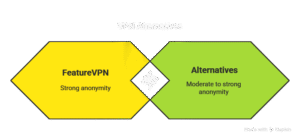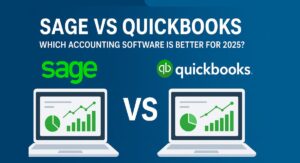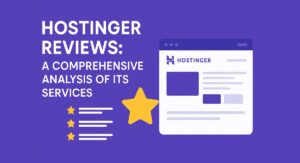The Importance of VPN Alternatives for Secure Browsing
The importance of online privacy and security has never been more critical. As we increasingly rely on the internet for everything—from work to entertainment—concerns about data breaches, tracking, and restricted websites grow every day. Virtual Private Networks (VPNs) have long been a go-to solution for secure and private browsing, but they’re not always the best fit for everyone. Whether it’s limited speeds, subscription fees, or other constraints, some users are looking for reliable VPN alternatives.
If you’re wondering about other options to protect your online privacy, this guide dives deep into various alternatives to VPNs, breaking down their pros, cons, and ideal use cases.
Why Consider VPN Alternatives?
Before we jump into the alternatives, it’s worth looking at why someone might choose not to use a VPN. While VPNs are indispensable for many, they do have their limitations:
-
Subscription Costs: Many trusted VPN providers charge monthly or yearly fees, which can add up over time.
-
Speed Bottlenecks: Even the best VPNs can slow down your internet connection due to encryption and rerouting traffic.
-
Blocked Services: Some streaming and gaming platforms block VPNs, restricting access to international libraries or content.
-
Mistrust in Providers: Users worry about transparency, especially when VPN services are free or retain connection logs.
For these and other reasons, people are exploring alternatives that cater to their needs without the drawbacks of traditional VPNs. Below, we outline the most popular VPN alternatives to secure your online activity.
Top VPN Alternatives You Should Consider
1. Smart DNS
Smart DNS is a service designed to reroute specific parts of your online traffic, like region-specific website requests. Unlike VPNs, it doesn’t encrypt your entire connection, making it a faster solution for accessing geo-restricted content.
-
Pros:
-
Superfast speeds since no heavy encryption is involved.
-
Easy-to-set-up configurations on devices like smart TVs and gaming consoles.
-
Access to global content libraries for streaming services like Netflix or Hulu.
-
-
Cons:
-
No data encryption or anonymity; ISPs can still see your traffic.
-
Doesn’t hide your IP address.
-
Limited capabilities for bypassing domestic censorship.
-
-
Ideal for: If you’re primarily looking for access to restricted streaming content without needing encryption, Smart DNS might be the tool for you.
2. Proxies
A proxy server acts as an intermediary between your device and the internet. It hides your IP address and is often used for bypassing content restrictions or improving anonymity.
-
Pros:
-
Simple and often free to use.
-
Reduces region-based barriers for websites.
-
Works across browsers without installing additional software.
-
-
Cons:
-
Free proxies can expose users to risks like data leaks.
-
No comprehensive encryption for browsing activity.
-
Lower efficiency for streaming or gaming platforms.
-
-
Ideal for: People who need to bypass minor content barriers or hide their IP address casually.

3. Encrypted DNS (DNS-over-HTTPS)
Encrypted DNS services like Quad9 or Cloudflare’s 1.1.1.1 ensure that your DNS queries are private. These queries are often visible to ISPs, making Encrypted DNS a secure step for protecting your browsing history.
-
Pros:
-
Provides protection against ISP tracking.
-
Simple to configure and often free.
-
Improves privacy for basic web browsing.
-
-
Cons:
-
Doesn’t secure the entire internet connection.
-
Cannot bypass geo-restricted content.
-
-
Ideal for: Users seeking an easy-to-implement solution for enhancing online privacy without the complexities of VPNs.
4. Tor (The Onion Router)
Tor is a free software that enables anonymous communication by routing your internet traffic through multiple layers of encrypted servers, known as “nodes.”
-
Pros:
-
Excellent for anonymity—even your ISP won’t know what you are doing.
-
Free for use and open-source for transparency.
-
Works on both desktop and mobile devices.
-
-
Cons:
-
Slower browsing speeds due to traffic hopping between nodes.
-
May not support streaming and other high-data-use activities.
-
Certain services and websites block Tor users.
-
-
Ideal for: Activists, journalists, or anyone in need of strong anonymity for sensitive tasks.
5. Zero Trust Network Access (ZTNA)
ZTNA is a modern approach used by organizations to grant secure access to resources. Unlike VPNs that give network-wide access, ZTNA strictly limits access to specific applications or files.
-
Pros:
-
Strong security for businesses and their remote workers.
-
Limits potential damage from cyberattacks.
-
More scalable and flexible for larger organizations.
-
-
Cons:
-
Not ideal for casual individual use; mostly suited for corporate setups.
-
Requires complex initial setup and support.
-
-
Ideal for: Companies looking to secure sensitive data or manage remote teams effectively.
6. Direct IP Allowlisting
IP allowlisting is a practice where only approved IP addresses are granted access to specific resources or networks. This method removes dependency on third-party services.
-
Pros:
-
No middleman, keeping data entirely under your control.
-
Simple for small-scale setups.
-
No recurring subscription costs.
-
-
Cons:
-
Requires a static IP, which not every user has access to.
-
Offers no anonymity or encryption for other web activity.
-
-
Ideal for: Small businesses or tech-savvy individuals seeking precise access control.
7. Decentralized VPN Solutions
Unlike traditional VPNs, decentralized VPNs (dVPNs) operate on blockchain technology. Instead of central servers, they use community-shared bandwidth, improving privacy.
-
Pros:
-
No central authority, reducing privacy concerns.
-
Data is harder to compromise.
-
Often cheaper compared to traditional subscription-based VPNs.
-
-
Cons:
-
Relatively new technology with limited mainstream adoption.
-
Speeds might depend on shared community bandwidth.
-
-
Ideal for: Privacy-conscious users who trust blockchain solutions.
Comparing VPNs and Their Alternatives
| Feature | VPN | Alternatives |
|---|---|---|
| Encryption | Yes | Varied |
| Anonymity | Strong | Moderate to Strong |
| User-Friendliness | High | Varied |
| Cross-Platform Support | Universal | Limited on some options |
| Cost | Free to Subscription | Often Free/One-time fee |

Each option has unique strengths tailored for different use cases.
How to Choose the Best Option for Your Needs?
To find the right alternative, consider these factors:
-
Your Primary Goal: Are you concerned about privacy, accessing global content, or both?
-
Budget Constraints: Some paid alternatives may be worth the investment, but free options can work in many scenarios.
-
Technical Expertise: Choose a solution you’re comfortable using and setting up.
-
Speed Requirements: Activities like gaming or streaming demand faster, lightweight alternatives.
Final Thoughts
Traditional VPNs do an excellent job of balancing privacy, security, and performance, but they’re not the one-size-fits-all solution to online privacy concerns. Whether you lean toward Smart DNS for streaming, Tor for anonymity, or encrypted DNS for casual privacy boosts, there’s an option perfect for your specific needs.
Exploring alternatives doesn’t mean VPNs are obsolete. Instead, it’s about choosing the right approach for particular circumstances. Each tool or service, with its unique features, complements the modern internet user’s quest for security and freedom.
Take Action Today!
Curious about these VPN alternatives? Begin your transition to a more secure browsing experience by experimenting with the tools mentioned above. Whether you try Smart DNS or give Tor a shot, the first step towards safer internet habits starts today!





